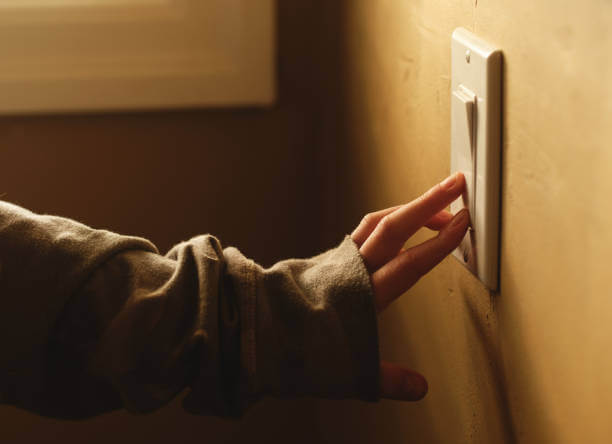
Why Don’t Orthodox Jews Turn On Lights on Shabbat?
You may be aware that religious Jews do not work on Shabbat.
You may also be aware that religious Jews do not do a whole slew of things on Shabbat, such as igniting
a fire or even turning on lights.
You are certainly aware that turning on the lights isn’t a whole lot of work.
What gives? Why do observant Jews refrain from so many activities on Shabbat that require virtually
zero work? In fact, avoiding those activities sometimes even creates more work!
Sure, lighting a fire used to be pretty laborious, rubbing two sticks together or whatever you had to do.
That was then. This is now. Does it make sense to observe a “day of rest” by not flicking light switches?
What’s going on here?
Work vs. Melacha
The answer to this question lies in the fact that what is prohibited by the Torah on Shabbat is not
actually “work” – it’s something called “melacha”. Translating from one language to another is always
rather fraught, and in this case, quite a bit has been lost in translation. Melacha doesn’t quite mean
work, or toil, or labor. We’re missing a word in English to properly capture it.
Let’s understand what melacha really means.
Interestingly, the word melacha in Hebrew is spelled exactly the same as the word “malach” with an
added letter hei at the end. The hei acts as a suffix to switch a word from masculine to feminine – for
example: par is a bull; parah (par + hei) is a cow. So a melacha is the feminine version of a malach.
Great. What’s a malach?
Well, the word malach is generally translated even more misleadingly as “angel.” If you are a citizen of
Western civilization, this word inevitably evokes an image of a person dressed in a white robe with fluffy
white wings, possibly sitting on a white cloud and playing a harp.
That is not a malach.
The word malach does refer to some kind of heavenly being; but it also refers in various places in the
Torah to human messengers. Strictly speaking, the word “malach” means an agent. One person can send
another as an agent to accomplish something on their behalf – deliver a message, purchase an item, etc.
Likewise, God can send a malach as an agent to accomplish some task on Earth – for example, He sent a
malach to heal Abraham after his circumcision.
What does this tell us about melacha?
Male vs. Female
If malach is masculine and melacha is feminine, we need to understand what it means to be masculine
or feminine. Note that although there is male energy in the world and female energy, this doesn’t mean
that all men are always one way and all women are always another way. Everyone has a mix of both
energies. Men tend to have more male energy and women tend to have more female energy.
What is the nature of these energies?
To understand this point, we can look at the area where the expression of maleness and femaleness is
starkest: in the reproductive sphere. In the act of reproduction, the man contributes the seed of a new
life – the creative potential. The woman receives this potential and makes it actual, develops it into its
full form. To be male is to create a spark and give it over; to be female is to receive and develop it. As
the midrash puts it: man brings home wheat; can you eat wheat? Rather, the woman takes the wheat
and bakes croissants (I am paraphrasing here).
Neither role is more important than the other – without someone bringing home the wheat, there’s no
food. And without someone preparing the wheat into croissants – also no food.
Malach vs. Melacha
Let’s now apply this understanding to our question. What is the difference between a malach and a
melacha?
A malach is a male energy, an initiating of something that needs to be done, an actor upon the world –
it’s an agent. A melacha is the female energy – the actual action upon the world, the transferring of that
initial directive into its influence on the world. It is the expression of agency, of the ability to make that
influence real.
When we do melacha, we are expressing our human agency on the world, demonstrating our ability to
influence, control, and change it. When we light a fire – even as effortlessly as striking a match – we are
actualizing our capacity for industry, for the manipulation of the natural world. So too when we plant a
tree, build a structure, or bake a croissant – all forbidden activities. Shabbat is not a day of relaxation
from physical labor – it is a day of refraining from melacha, from expressing our control over the world.
The flipside of this is that by abstaining from control, we are recognizing that God is actually in control.
Shabbat was the culminating day of God’s creating the world. Every week we are enjoined to stop and
remember that – and not just to remember it, but to live it.
Actions speak louder than words: Shabbat is a time when we truly live as if God is running the world,
and not us. For a short time, we hand Him back the keys and let Him drive the boat. Sure, Shabbat is a
great time to relax. But more importantly, it’s a time to remember.
God is steering this ship. He’s got it all under control. He’s got you covered.
By refraining from melacha, from activities that express our agency in the world, we make it real to
ourselves: there’s a God in the world – and I am not Him. On Shabbat, we can put down our shovels and
hoes, our drills and engines, our iPhones and laptops, and remind ourselves that ultimately, God is in
control, and we can rely on Him to ably and dependably run the show.
 Rabbi Raffi Bilek, LCSW-C is a family coach/therapist and writer in Baltimore, MD, where he spends his time helping people grow in their relationships, spreading Torah ideas, and generally healing the world. He also likes playing Scrabble. You can find his latest book at https://mosaicapress.com/
Rabbi Raffi Bilek, LCSW-C is a family coach/therapist and writer in Baltimore, MD, where he spends his time helping people grow in their relationships, spreading Torah ideas, and generally healing the world. He also likes playing Scrabble. You can find his latest book at https://mosaicapress.com/
If you found this content meaningful and want to help further our mission through our Keter, Makom, and Tikun branches, please consider becoming a Change Maker today.







